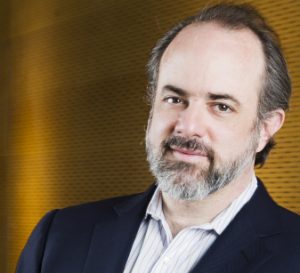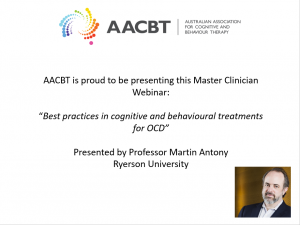Master Clinician webinar series
Best practices in cognitive and behavioural treatments for OCD
Professor Martin Antony (Ryerson University)

This 3hr 29min Master Clinician series webinar was recorded in July 2020.
AACBT members can view for free.
Non-members may purchase here.

Obsessive-compulsive disorder (OCD) is a fascinating condition that often looks very different across individuals. It rarely improves without treatment, and it can be challenging to treat. This Masterclass provides an overview of evidence-based approached to treating OCD.
OCD is a common condition associated with unwanted thoughts, images, or urges (obsessions) and repeated behaviours aimed at reducing anxiety or preventing danger (compulsions).
This Masterclass provides an overview of cognitive and behavioural strategies for treating OCD. Participants will learn about the theoretical foundations, empirical evidence, and practical application of well-established behavioural approaches (e.g., exposure and response prevention) and cognitive approaches (e.g., experiments, cognitive restructuring), as well as emerging acceptance and mindfulness-based approaches.
Although the focus will be primarily on treating adults, adaptations for children will also be covered. The class will also discuss the evidence concerning key treatment decisions and modalities (e.g., group vs. individual treatment; teletherapy; combining CBT with medication; intensive treatments; clinician-supported self-help, etc.).
Methods for enhancing motivation and engagement will be reviewed, as will strategies for dealing with treatment-interfering behaviours.
Special considerations for treating OCD during the COVID-19 pandemic will also be discussed. Participants will receive a detailed list of resources.
Key Learning Objectives
- An understanding of evidence-based behavioural strategies for treating OCD, such as exposure and response prevention
- An understanding of cognitive strategies for treating OCD, such as cognitive restructuring and experiments
- An understanding of strategies for resolving ambivalence, promoting engagement, and dealing with treatment-interfering behaviours
Participants will learn practical, step-by-step, methods for treating OCD. Strategies for maximising the effectiveness of exposure and response prevention will be discussed, as will best practices for implementing cognitive strategies. Participants will also learn about mindfulness and acceptance-based approaches, and methods for engaging clients and managing ambivalence. At the end of the Masterclass, participants will be equipped with tools that they can apply in their practices, as well as a list of resources that they can use to further deepen their knowledge and skills.
References:
Clark, D.A. (2020). Cognitive-behavioral therapy for OCD and its subtypes, 2nd ed. New York, NY: Guilford Press.
Franklin, M.E., & Foa, E.B. (2014). Obsessive-compulsive disorder. In D.H. Barlow (Ed.), Clinical handbook of psychological disorders (pp. 155-205). New York, NY: Guilford Press.
Öst, L.-G., Havnen, A., Hansen, B., & Kvale, G. (2015). Cognitive behavioral treatments of obsessive-compulsive disorder: A systematic review and meta-analysis of studies published 1993-2014. Clinical Psychology Review, 40, 156-169.
Professor Antony includes many additional titles as recommended readings throughout the presentation (for clients and therapists).
Biographical Information
Martin M. Antony is professor in the Department of Psychology at Ryerson University, provincial clinical lead for the Ontario Structured Psychotherapy Program, and president of the Association for Behavioral and Cognitive Therapies. Previously, he was founding director of both the Anxiety Treatment and Research Clinic and the Psychology Residency Program at St. Joseph’s Healthcare Hamilton. He is a fellow of the Royal Society of Canada, and previously served as president of the Canadian Psychological Association. He has published over 30 books and over 250 scientific articles and chapters in areas related to cognitive behavior therapy and anxiety-related disorders. He has given more than 425 presentations to audiences across four continents, and has been interviewed, featured, or quoted more than 450 times in various print, radio, television, and online media outlets, including CBC, CNN, Globe and Mail, National Post, Toronto Star, New York Times, Washington Post, Scientific American Mind, and many others.
Images supplied

